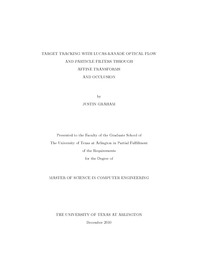
ATTENTION: The works hosted here are being migrated to a new repository that will consolidate resources, improve discoverability, and better show UTA's research impact on the global community. We will update authors as the migration progresses. Please see MavMatrix for more information.
Show simple item record
| dc.contributor.author | Graham, Justin | en_US |
| dc.date.accessioned | 2011-03-03T21:53:21Z | |
| dc.date.available | 2011-03-03T21:53:21Z | |
| dc.date.issued | 2011-03-03 | |
| dc.date.submitted | January 2010 | en_US |
| dc.identifier.other | DISS-10908 | en_US |
| dc.identifier.uri | http://hdl.handle.net/10106/5525 | |
| dc.description.abstract | This paper investigates a hybrid approach derived from Lucas-Kanade optical flow tracking and particle filters that is capable of tracking objects through occlusion and affine transformations. This approach is inspired by aircraft sensor pod infrared and electro-optical tracking applications. For aircraft based sensors, it is important that a tracking system be able to track through rotations as the aircraft orbits a targeting area. It is also of use to handle cases where the target may be momentarily occluded due to other vehicles or obstacles in the area. The main focus of this investigation is to find a technique that performs well in these scenarios for a single tracked target. For tracking performance verification, the implementation of this algorithm is written in Matlab and is not intended to run in realtime, but could be easily extended to do so with minor runtime performance tweaks and native implementations of some of the more performance intensive functions. | en_US |
| dc.description.sponsorship | Kamangar, Farhad | en_US |
| dc.language.iso | en | en_US |
| dc.publisher | Computer Science & Engineering | en_US |
| dc.title | Target Tracking With Lucas-kanade Optical Flow And Particle Filters Through Affine Transforms And Occlusion | en_US |
| dc.type | M.Engr. | en_US |
| dc.contributor.committeeChair | Kamangar, Farhad | en_US |
| dc.degree.department | Computer Science & Engineering | en_US |
| dc.degree.discipline | Computer Science & Engineering | en_US |
| dc.degree.grantor | University of Texas at Arlington | en_US |
| dc.degree.level | masters | en_US |
| dc.degree.name | M.Engr. | en_US |
Files in this item
- Name:
- Graham_uta_2502M_10908.pdf
- Size:
- 4.197Mb
- Format:
- PDF
This item appears in the following Collection(s)
Show simple item record


